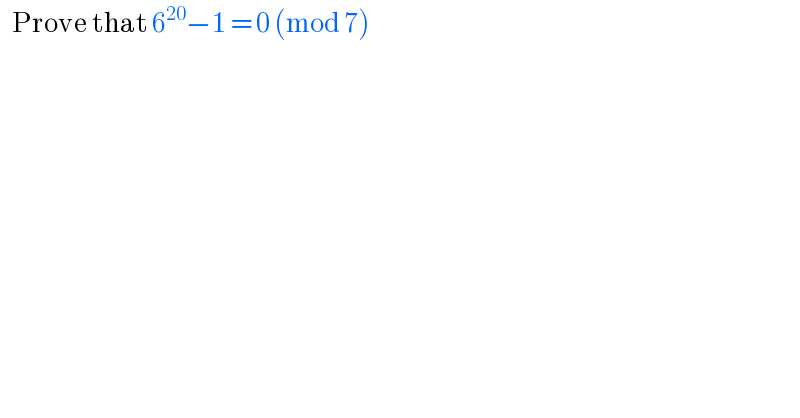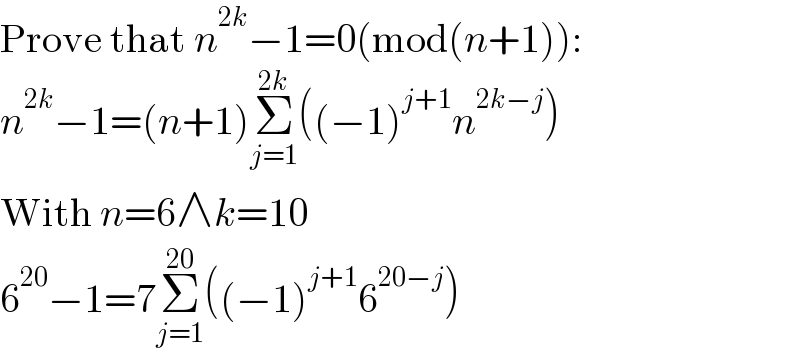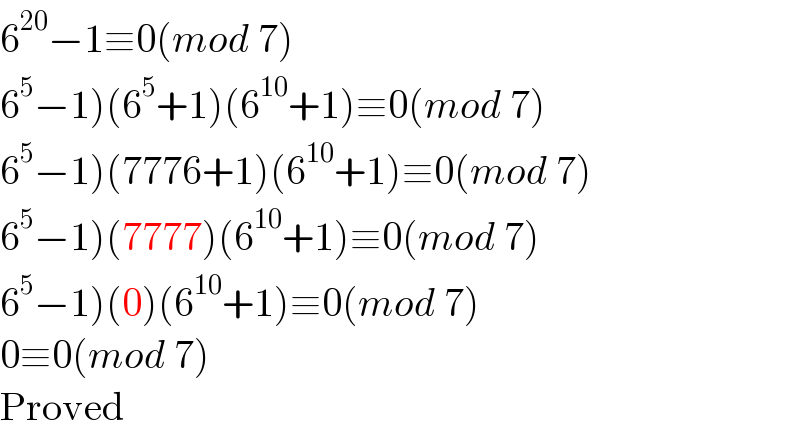
Question Number 206999 by efronzo1 last updated on 03/May/24

$$\:\:\:\mathrm{Prove}\:\mathrm{that}\:\mathrm{6}^{\mathrm{20}} −\mathrm{1}\:=\:\mathrm{0}\:\left(\mathrm{mod}\:\mathrm{7}\right) \\ $$
Commented by Frix last updated on 03/May/24

$$\mathrm{Prove}\:\mathrm{that}\:{n}^{\mathrm{2}{k}} −\mathrm{1}=\mathrm{0}\left(\mathrm{mod}\left({n}+\mathrm{1}\right)\right): \\ $$$${n}^{\mathrm{2}{k}} −\mathrm{1}=\left({n}+\mathrm{1}\right)\underset{{j}=\mathrm{1}} {\overset{\mathrm{2}{k}} {\sum}}\left(\left(−\mathrm{1}\right)^{{j}+\mathrm{1}} {n}^{\mathrm{2}{k}−{j}} \right) \\ $$$$\mathrm{With}\:{n}=\mathrm{6}\wedge{k}=\mathrm{10} \\ $$$$\mathrm{6}^{\mathrm{20}} −\mathrm{1}=\mathrm{7}\underset{{j}=\mathrm{1}} {\overset{\mathrm{20}} {\sum}}\left(\left(−\mathrm{1}\right)^{{j}+\mathrm{1}} \mathrm{6}^{\mathrm{20}−{j}} \right) \\ $$
Answered by Rasheed.Sindhi last updated on 03/May/24
![6^(20) −1≡0(mod 7) (−1)^(20) −1≡(mod 7) [∵ 6≡−1(mod 7)] 1−1≡0(mod 7) 0≡0(mod 7) Hence proved](Q207001.png)
$$\mathrm{6}^{\mathrm{20}} −\mathrm{1}\equiv\mathrm{0}\left({mod}\:\mathrm{7}\right) \\ $$$$\left(−\mathrm{1}\right)^{\mathrm{20}} −\mathrm{1}\equiv\left({mod}\:\mathrm{7}\right)\:\left[\because\:\mathrm{6}\equiv−\mathrm{1}\left({mod}\:\mathrm{7}\right)\right] \\ $$$$\:\:\:\:\:\mathrm{1}−\mathrm{1}\equiv\mathrm{0}\left({mod}\:\mathrm{7}\right) \\ $$$$\:\:\:\:\:\:\:\:\:\mathrm{0}\equiv\mathrm{0}\left({mod}\:\mathrm{7}\right) \\ $$$$\:\:\:\:\:\mathcal{H}{ence}\:{proved} \\ $$
Answered by A5T last updated on 03/May/24

$$\mathrm{6}^{\mathrm{6}} \equiv\mathrm{1}\left({mod}\:\mathrm{7}\right)\Rightarrow\mathrm{6}^{\mathrm{20}} =\left(\mathrm{6}^{\mathrm{6}} \right)^{\mathrm{3}} \mathrm{6}^{\mathrm{2}} \equiv\mathrm{6}^{\mathrm{2}} \equiv\mathrm{1}\left({mod}\:\mathrm{7}\right) \\ $$$$\Rightarrow\mathrm{6}^{\mathrm{20}} −\mathrm{1}\equiv\mathrm{0}\left({mod}\:\mathrm{7}\right) \\ $$
Answered by Rasheed.Sindhi last updated on 03/May/24

$$\mathrm{6}^{\mathrm{20}} −\mathrm{1}\equiv\mathrm{0}\left({mod}\:\mathrm{7}\right) \\ $$$$\left.\mathrm{6}^{\mathrm{5}} −\mathrm{1}\right)\left(\mathrm{6}^{\mathrm{5}} +\mathrm{1}\right)\left(\mathrm{6}^{\mathrm{10}} +\mathrm{1}\right)\equiv\mathrm{0}\left({mod}\:\mathrm{7}\right) \\ $$$$\left.\mathrm{6}^{\mathrm{5}} −\mathrm{1}\right)\left(\mathrm{7776}+\mathrm{1}\right)\left(\mathrm{6}^{\mathrm{10}} +\mathrm{1}\right)\equiv\mathrm{0}\left({mod}\:\mathrm{7}\right) \\ $$$$\left.\mathrm{6}^{\mathrm{5}} −\mathrm{1}\right)\left(\mathrm{7777}\right)\left(\mathrm{6}^{\mathrm{10}} +\mathrm{1}\right)\equiv\mathrm{0}\left({mod}\:\mathrm{7}\right) \\ $$$$\left.\mathrm{6}^{\mathrm{5}} −\mathrm{1}\right)\left(\mathrm{0}\right)\left(\mathrm{6}^{\mathrm{10}} +\mathrm{1}\right)\equiv\mathrm{0}\left({mod}\:\mathrm{7}\right) \\ $$$$\mathrm{0}\equiv\mathrm{0}\left({mod}\:\mathrm{7}\right) \\ $$$$\mathrm{Proved} \\ $$
